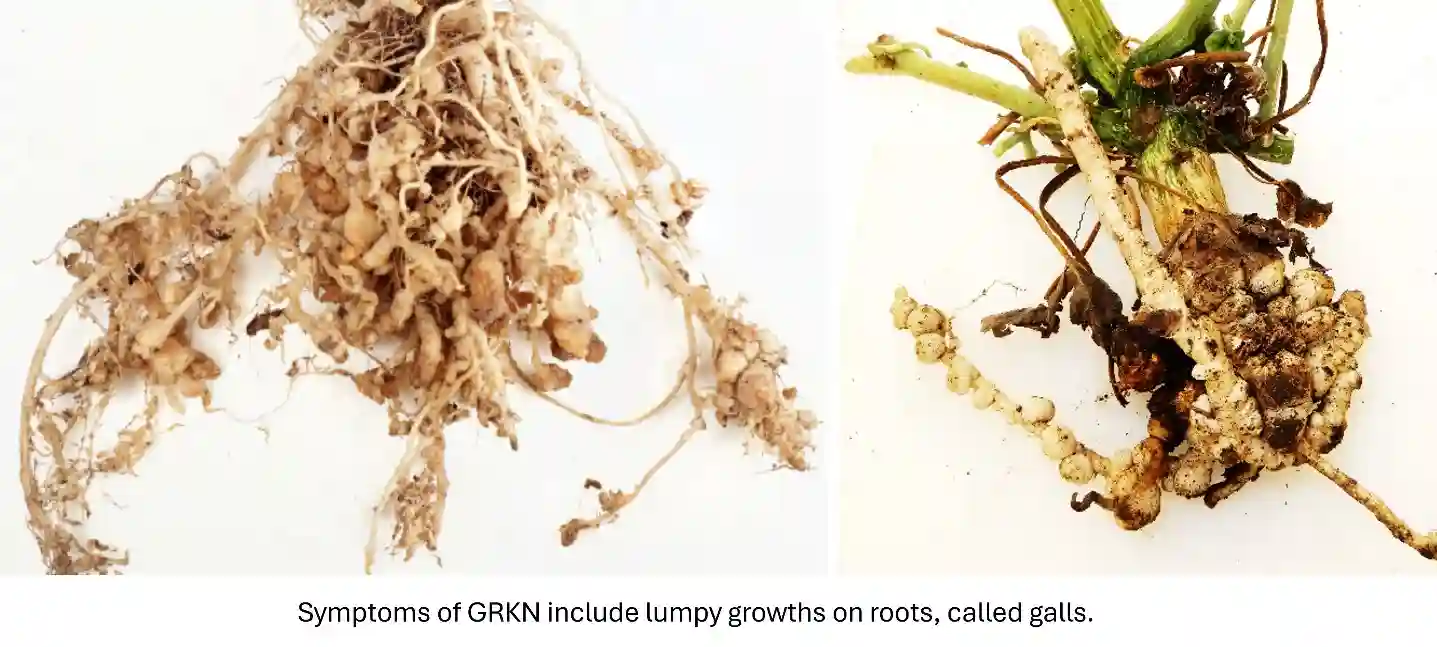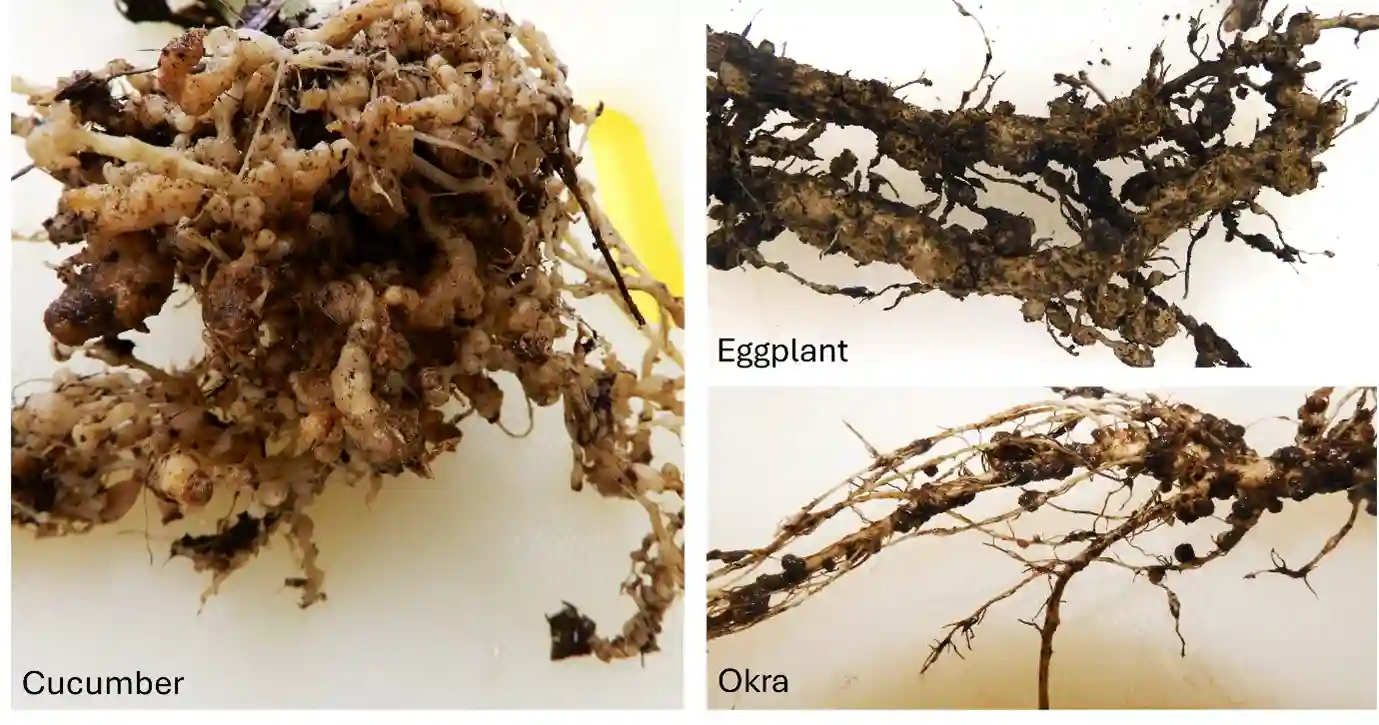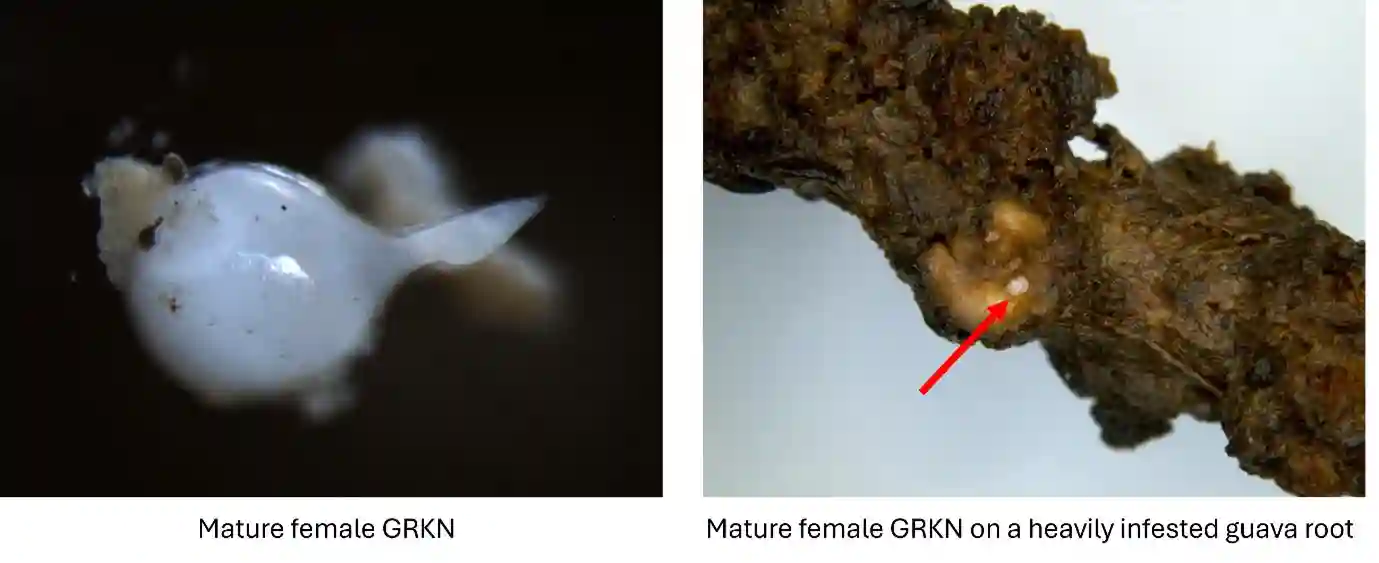Guava root-knot nematode
Guava root-knot nematode (GRKN) is a microscopic plant-parasitic round worm.
It's scientific name is Meloidogyne enterolobii.
While many other Meloidogyne species are already present in the NT, GRKN is considered significant because of its:
- wide range of host plants
- high reproduction rate
- impacts on yields in preferred host crops.
Appearance and symptoms
GRKN infection include lumpy growths on roots, called galls.
Tuber crops can also be damaged.
Above ground, plants may appear yellow, stunted, and wilting.
Where it's found
GRKN is found in tropical to subtropical areas of the world including:
- the NT - first detected in September 2022 on several properties in the greater Darwin region
- Queensland
- Central and South America
- Africa
- Asia
- several US states
- some European countries (in greenhouse settings).
Host plants
GRKN can infect the following host plants:
- banana
- capsicum
- eggplant
- guava
- pak choy
- soybean
- buk choy
- chilli
- fig
- jackfruit
- papaya/pawpaw
- sweet potato
- cabbage
- cotton
- gai lan
- melons
- pumpkin
- tomato
- cape gooseberry
- cucumber
- galangal
- okra
- snake bean
- zucchini.
See photos of infections below.
For a list of more susceptible hosts, read the simplified host document PDF (137.9 KB).
How it spreads
GRKN cannot move very far on their own.
Humans play a big role in their spread and introduction into new areas.
It can be transmitted through infected plant material, such as:
- bulbs, tubers, and roots
- contaminated soil via boots, tools, and farm equipment.
Life cycle
GRKN is reliant on live roots to feed and reproduce.
Juveniles hatch from eggs in the soil or root debris, and travel through soil to invade new roots.
They feed on roots and this stimulates cells causing root tissue to enlarge and form an abnormal growth.
Mature females lose their mobility and become inactive. They can:
- produce eggs without males
- lay eggs inside or on the root surface.
The eggs hatch immediately or can become dormant. Eggs can survive in the soil (without a host) for up to 12 months.
The pest takes about 4 to 5 weeks to complete its life cycle.
Females can produce 400 to 600 eggs in this time.
Prevention and management
To prevent and manage GRKN, you should:
- clean footwear, tools, machinery, and vehicles before moving between sites
- monitor who and what comes to your property
- source clean seedlings and plant material
- look for symptoms via regular soil sampling and testing
- suppress weeds and use weed-free bare fallows to remove:
- potential host plants and food sources
- expose the upper layers of the soil to heating and drying by the sun
- use mulch, compost and green manures to increase predators and parasites
- cultivate a non-host cover crop to reduce GRKN between annual crops, such as:
- forage sorghum (some varieties)
- oats (some varieties)
- rhodes grass
- signal grass
- sunn hemp
- peanut.
Research is also currently underway to determine other regionally-appropriate management strategies.
Chemical treatment
Chemical treatment like nematicides may also be considered with integrated pest management (IPM) practices.
Prior to application, you should count the population and do DNA tests to identify the pest.
You should also check the APVMA PubCRIS database for registered chemicals, labels, and withholding periods.
How to report
If you think your plants in the NT may have GRKN, contact the Plant Pathology team by:
- calling 08 8999 2218
- emailing plant.pathology@nt.gov.au.
How to submit a sample
To prepare your sample for sending, you must:
- fill in a sample submission form PDF (207.3 KB)
- follow instructions on the GRKN fact sheet PDF (404.7 KB).
Once you're prepared your sample, you can submit it with your form by mail or in person to:
Plant Pathology
Department of Agriculture and Fisheries
Berrimah Farm, Combined Scientific Services Building,
29 Makagon Road
Berrimah NT 0828
More information
Read the GRKN fact sheet in:
You can read more about GRKN on the Australasian Plant Pathology Society (APPS) website or the AUSVEG website.
Contact
For updates, go to the Agriculture NT Facebook page.
You can also call 08 8999 2188 or email plantbiosecurity@nt.gov.au.
Give feedback about this page.
Share this page:
URL copied!


